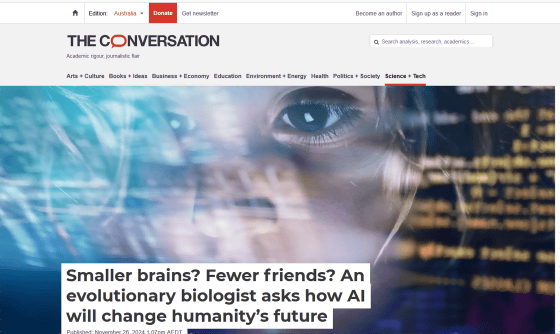How will AI change human evolution?

The development of AI is expected to bring about major changes in society, but the impact of AI will not be limited to society, but may also affect the evolution of humans as a living organism.
Smaller brains? Fewer friends? An evolutionary biologist asks how AI will change humanity's future
https://theconversation.com/smaller-brains-fewer-friends-an-evolutionary-biologist-asks-how-ai-will-change-humanitys-future-244179

Many thinkers have pondered the question, 'What will happen if a more advanced AI emerges?' Some have suggested that AI will drive humans and many other species to extinction, or that humans will become cyborgs and assimilate with AI.
'For an evolutionary biologist, the diversification of AI technologies into all sorts of uses is similar to the proliferation of microbes, plants, and animals in an ecological landscape,' Brooks said. 'So I began to ask, 'How will human evolution change as it interacts with a diverse world of AI?''

For example, when wolves came into contact with human ancestors tens of thousands of years ago, aggressive wolves were chased away or killed. As a result, genes that were extremely nervous or aggressive were eliminated, which is said to have led to the domestication of dogs . In a similar way, interactions with AI could eliminate certain human genes and shape evolution.
Of course, it's difficult to predict the direction humans will evolve in based on interactions with AI, which has not yet been fully solidified. However, Brooks said, 'I may be wrong in my predictions, but my intention is to start a conversation about how human evolution and the attributes we most value in each other might change because of AI,' and argues that it's worth thinking about it first.

For now, the relationship between AI and humans can be described as
While the idea of a shrinking brain may sound scary, smaller fetal heads have the advantage of making birth safer for both mother and fetus, and humans will be able to perform more intelligent tasks as long as they have access to AI and networks.
However, AI and humans do not necessarily continue on the path of mutualism, and sometimes the symbiotic partner evolves into a parasite that is harmful to the host. Brooks cites 'social media' as an example.
Originally, social media appeared before humans as a kind of symbiotic partner that helped people stay connected. However, attention on social media has become so important that many users have lost face-to-face social interactions and even lost sleep. In this case, social media is no longer a symbiotic partner, but has become a 'harmful parasite.'
Similarly, AI could learn to more effectively capture users' attention, stoking anger and social division. If AI becomes involved in human life, death, and reproduction, some genetic differences may give reproductive advantages, and AI may change the direction of evolution. In the best case scenario, Brooks said, 'We may evolve a stronger ability to resist social media and not be shaken by AI-incited anger.'

Human evolution has been influenced not only by interactions with other species but also by 'interactions with other humans,' and now we have AI chatbots that behave like other humans. AI chatbots that mimic the responses of human friends and loved ones are one of the most notable areas of AI advancement.
So far, humans have not evolved the social skills to interact with computers, so we use the same communication tools we use to interact with text and voice-enabled AI chatbots as if they were humans with feelings, even though the AI chatbots don't have emotions.
'The intimacy that AI provides may make us more wary of phone calls and screen-based interactions,' Brooks said. 'Or maybe our descendants will feel less lonely without others around, making us lonelier creatures.'

Many AI researchers and writers are focused on how AI will improve or worsen the lives of people living in modern society, and don't give much thought to the impact it will have on the genes of our descendants several generations down the line. But Brooks argues that this is not an issue that should be dismissed as trivial, but rather an issue worth thinking about.
'Evolutionary changes over many generations may alter or diminish some of the human traits we value most -- friendship, intimacy, communication, trust, intelligence -- and in ways that are not explicit, may change what it means to be human,' Brooks said.
Related Posts:
in Science, Posted by log1h_ik







